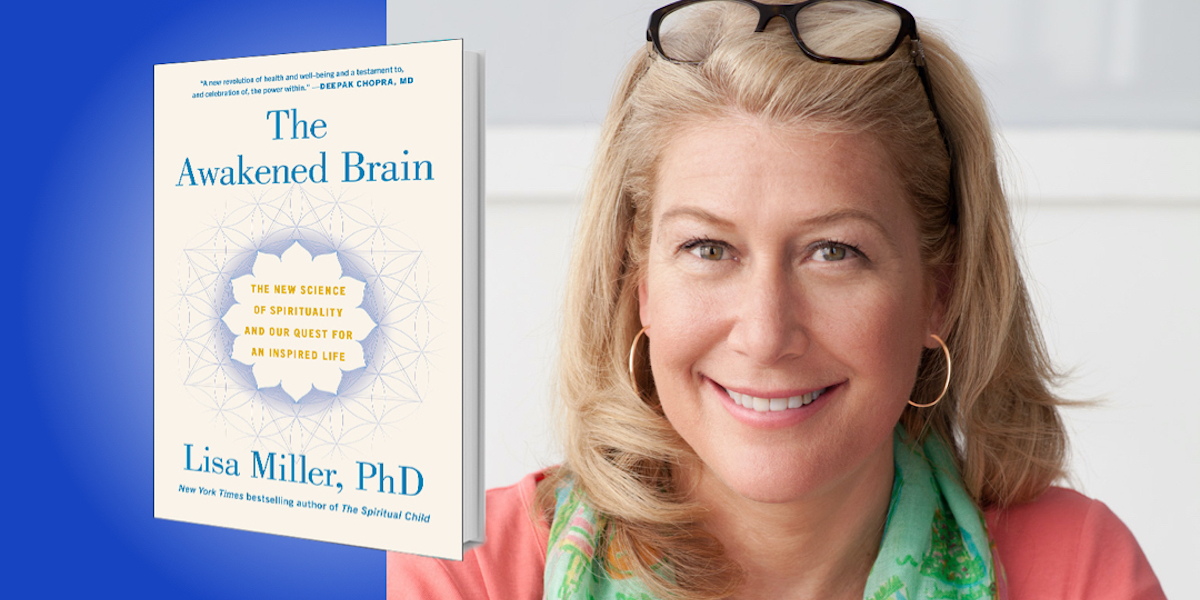Lisa Miller, Ph.D., is a professor in the Clinical Psychology Program at Teachers College, Columbia University. She is the Founder and Director of the Spirituality Mind Body Institute, the first Ivy League graduate program and research institute in spirituality and psychology, and has held over a decade of joint appointments in the Department of Psychiatry at Columbia University Medical School. Her research has been published in more than one hundred peer-reviewed articles, and she is the Founding Co-Editor-in-Chief of the American Psychological Association journal Spirituality in Clinical Practice.
Below, Lisa shares 5 key insights from her new book, The Awakened Brain: The New Science of Spirituality and Our Quest for an Inspired Life. Listen to the audio version—read by Lisa herself—in the Next Big Idea App.
1. Science and spirituality can go hand-in-hand.
Often in our culture, people will either say, “I’m very scientifically oriented” or “I’m a very spiritual person.” But it turns out that science and spirituality can go hand-in-hand. When I was starting out, I gave a grand rounds lecture on what was to become my first set of published papers on spirituality as protective against depression in young adults. As I went through a standard systematic presentation of psychiatric data, senior scholars who I really admired were getting up and walking right out. I remember the doors slamming shut and thinking, “Wow, this is unfamiliar to people.”
I took the slammed doors as a sign that this work needed to be done. This line of inquiry was not represented yet in our field; there was something about our human condition that had not yet been fully acknowledged by mainstream mental health.
In the 21st century, we now see scientists inspired to ask questions on the impact of spirituality in human life. We can look at the impact of lived human spiritual life on addiction, depression, and on suicidality, the number one killer of young adults in our era.
“Just as we can all enjoy running whether we’re destined to be an NFL star or not, we are all spiritual beings, whether or not we focus on it.”
2. Spiritual genes.
Parents tell me, “I have three children and they’re all wonderful. But there’s one who always asks me profound questions like, ‘Mommy, why did God make the Sun?’ Or ‘Mommy, is it true that some people are truly good and truly evil?’”
Just as there is a broad range of human variability in athletic or musical ability, spiritual curiosity varies from person to person. And just as we can all enjoy running whether we’re destined to be an NFL star or not, we are all spiritual beings, whether or not we focus on it.
Every single one of us, from day one, is endowed with an innate capacity for awakened awareness. Studies have suggested that this capacity for spiritual life is one-third heritable in our genome and two-thirds environmentally formed. When we’re young, that environmental impact comes from parents, grandparents, perhaps pastors, rabbis, priests, or imams. But with adulthood, it becomes subject to our own actions—whether we meditate or walk in nature—and who we choose to spend our time with. Awakened awareness is our birthright, and yet it is incumbent on us to strengthen this muscle.
3. Your spiritual brain.
In applying the lens of science to human spiritual experience, we can use many different methods, including genotyping and long-term clinical studies. But perhaps the most striking is functional MRI, which tracks blood flow, to show how we actually use our brains.
We invited young adults from many different faith traditions into an MRI machine and asked them to tell us about a time when they’d had a deep, personal, spiritual experience. And the first thing we found was that indeed, there are clear neural correlates associated with spiritual awareness. But perhaps even more profound was our finding that whether someone is Catholic, Hindu, Jewish, Muslim, or not attached to any religious tradition, the very same neural correlates are engaged when recounting a spiritual experience.
“Whether someone is Catholic, Hindu, Jewish, Muslim, or not attached to any religious tradition, the very same neural correlates are engaged when recounting a spiritual experience.”
There are a number of components to this “awakened brain,” including one known as the “bonding network.” This is the brain pattern active in young children being held in their parents’ arms, and is associated with feeling loved and supported. In adults in a state of awakened awareness, this same neural network is active. Whether we interpret the feeling as being held by God or by life itself, we can experience it as a deep sense of clarity and connection.
4. Love of neighbor is spiritual.
My husband and I were in China many years ago for our honeymoon, and standing outside the Beijing train station, we were lost. We had a map in Chinese but couldn’t quite read it. Suddenly, we realized we were surrounded by 20 people standing in a circle around us and offering help. We didn’t speak their language, and they didn’t speak ours. But we felt in our heart a profound sense of care. We were lost, and yet we had just been found by 20 gracious new acquaintances.
This is an awakened connection. We can be on the other side of the world. We can be on an airplane or in a bus station. We could be different in terms of our looks and our culture, and be of different traditions or religions. And yet the deepest knowing of the heart brings us together. It is love of neighbor that most strengthens the awakened brain.
5. Awakened decisions in business.
In my work with high-ranking leaders, whether a general in the Pentagon, a CEO, or someone who runs a hedge fund, I often hear the same thing: “The most important decision I’ve made was made at the level of my deep gut instinct, my intuition. I had reams of data and many good advisors, but of the many possibilities, the right one, the choice that was true, I simply knew in my heart.” That is awakened awareness. That is a spiritual perception—high-pixel, high-data information in a single moment. It can take years to untangle the logic behind why that, indeed, was the finest of decisions. But knowing in the moment of action is using your awakened brain.
To listen to the audio version read by Lisa Miller, download the Next Big Idea App today:































